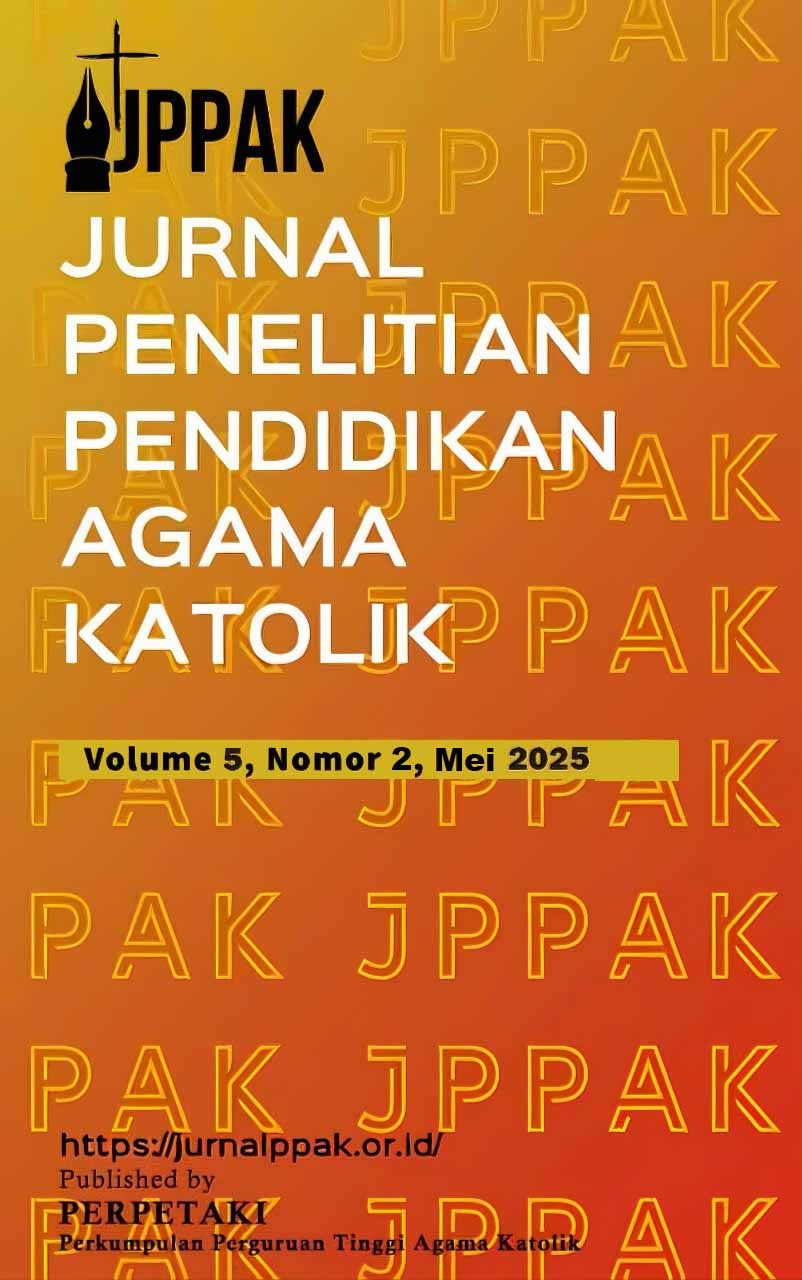Peran Katakese Pastoral dalam Membangun Iman dan Karakter di Era Modern
DOI:
https://doi.org/10.52110/jppak.v5i2.211Keywords:
Pastoral Catechesis, Faith, Character, Modern Era, Challenges, StrategiesAbstract
This research aims to thoroughly examine the role of pastoral catechesis in building faith and character in the modern era. The modern era is characterized by rapid and significant social, cultural, and technological changes. These changes present new challenges to individual faith and character, such as widespread secularism, the strong influence of social media, and the emergence of various ideologies that contradict moral values. The research method used is qualitative with a literature study approach. Data collection was carried out through analysis of literature relevant to the research topic. The literature analyzed includes theology books, scientific articles, Catholic Church documents, and research findings related to religious education and character building. Important findings from this research show that pastoral catechesis plays a crucial role in building individual faith and character in the face of contemporary challenges. Through a systematic process of learning and deepening faith, pastoral catechesis helps individuals to understand the teachings of the Church in depth, develop strong moral values, and build a close relationship with God. Moreover, pastoral catechesis also plays a role in equipping individuals with the knowledge and skills needed to face various challenges in everyday life. This includes the ability to navigate the digital world wisely, analyze information critically, distinguish between right and wrong values, and build healthy relationships with others. Effective and sustainable implementation of pastoral catechesis is key to strengthening the foundation of faith and strong character in today's modern society. This is important for building a community that is faithful, moral, and responsible in facing the challenges of the times, as well as for shaping future generations who are able to be the salt and light of the world.
Downloads
##submission.downloads##
Submitted
Accepted
Published
How to Cite
Issue
Section
License
Copyright (c) 2025 Jordan Leki, Daniel Labatar

This work is licensed under a Creative Commons Attribution-ShareAlike 4.0 International License.
Copyright Notice and Permissions
Jurnal Penelitian Pendidikan Agama Katolik offers immediate open access to all its content on the principle to make researches freely available to the public, especially to the scholars, to support greater global exchanges of knowledge. This journal encourages all scholarly authors to allow their research openly available, free access and without time restrictions.
All articles published Open Access will be immediately and permanently free for everyone to read and download. Under the CC BY-SA 4.0 license, authors retain ownership of the copyright for their article, however authors grant others permission to use the content of publications in Jurnal Penelitian Pendidikan Agama Katolik (JPPAK) in whole or in part provided that the original work is properly cited. Users (redistributors) of Jurnal Penelitian Pendidikan Agama Katolik (JPPAK) are required to cite the original source by including at least: the full title of the article, the author's or authors' full name(s), JPPAK as the initial source of publication, year of publication and volume number using a propriate citing method.
Copyright encompasses exclusive rights to reproduce and deliver the article in all form and media, including reprints, photographs, microfilms and any other similar reproductions, as well as translations. The reproduction of any part of this journal, its storage in databases and its transmission by any form or media, such as electronic, electrostatic and mechanical copies, photocopies, recordings, magnetic media is prohibited without consent of Jurnal Penelitian Pendidikan Agama Katolik (JPPAK).
Jurnal Penelitian Pendidikan Agama Katolik (JPPAK) is licensed under a Creative Commons Attribution Share-Alike 4.0 International. (CC BY-SA 4.0)
Authors who publish with Jurnal Penelitian Pendidikan Agama Katolik (JPPAK) agree to the following terms:
- Authors retain copyright and grant the journal right of first publication with the work simultaneously licensed under a Creative Commons Attribution Share-Alike 4.0 International (CC BY-SA 4.0) license that allows others to share the work with an acknowledgement of the work's authorship and initial publication in this journal.
- Authors are able to enter into separate, additional contractual arrangements for the non-exclusive distribution of the journal's published version of the work (e.g., post it to an institutional repository or publish it in a book), with an acknowledgement of its initial publication in this journal.
- Authors are permitted and encouraged to post their work online (e.g., in institutional repositories or on their website) after the publication on JPPAK, as long as it not published on other OJS for it will be treated as plagiarism by plagiarism checker apps. It can lead to productive exchanges, as well as earlier and greater citation of published work (See The Effect of Open Access).












